

39273 3. Diss research summary. Making best use of TAs printable. Education Week. Commentary —Chris Whetzel for Education Week By James R.
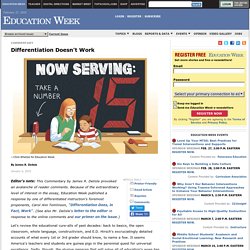
Delisle Editor's note: This Commentary by James R. Delisle provoked an avalanche of reader comments. Let's review the educational cure-alls of past decades: back to basics, the open classroom, whole language, constructivism, and E.D. But wait! Starting with the gifted-education community in the late 1960s, differentiation didn't get its mojo going until regular educators jumped onto the bandwagon in the 1980s. There's only one problem: Differentiation is a failure, a farce, and the ultimate educational joke played on countless educators and students. "By having dismantled many of the provisions we used to offer kids on the edges of learning, ... we have sacrificed the learning of virtually every student. " In theory, differentiation sounds great, as it takes several important factors of student learning into account: • It seeks to determine what students already know and what they still need to learn.
111.full. Meeting the individual needs of each child - New2Teaching website. Personalised learning Personalised learning has been defined by government ministers as that which takes place when there is an education system in which assessment, curriculum, teaching style and out-of-hours provision are all designed to discover and nurture the unique talents of every single pupil.
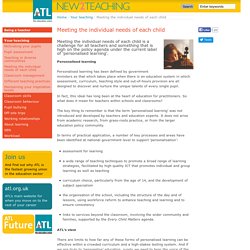
In fact, this ideal has long been at the heart of education for practitioners. So what does it mean for teachers within schools and classrooms? The key thing to remember is that the term 'personalised learning' was not introduced and developed by teachers and education experts. It does not arise from academic research, from grass-roots practice, or from the larger education policy community. In terms of practical application, a number of key processes and areas have been identified at national government level to support 'personalisation': ATL’s view What is accelerated learning? Using differentiation in mixed-ability classes. 'Differentiation' is a term that you will no doubt have encountered during your training.
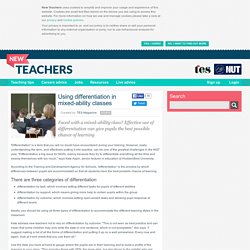
However, really understanding the term, and effectively putting it into practice, can be one of the greatest challenges in the NQT year. "Differentiation a big issue for NQTs, mainly because they try to differentiate everything all the time and swamp themselves with too much," says Kate Aspin, senior lecturer in education at Huddersfield University. According to the Training and Development Agency for Schools, 'differentiation' is the process by which differences between pupils are accommodated so that all students have the best possible chance of learning. 254. 271.full.
Web.b.ebscohost. Ped2019 assignment. Parent-Teacher Partnership. Going to School . Education. The experts have been polled and the results are in: a positive parent-teacher relationship contributes to your child’s school success.
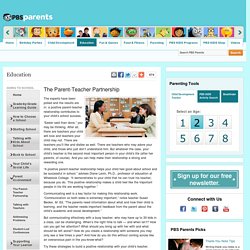
“Easier said than done,” you may be thinking. After all, there are teachers your child will love and teachers your child may not. There are teachers you’ll like and dislike as well. There are teachers who may adore your child, and those who just don’t understand him. But whatever the case, your child’s teacher is the second most important person in your child’s life (after her parents, of course). “A positive parent-teacher relationship helps your child feel good about school and be successful in school,” advises Diane Levin, Ph.D., professor of education at Wheelock College. Communicating well is a key factor for making this relationship work. But communicating effectively with a busy teacher, who may have up to 30 kids in a class, can be challenging. Try these strategies to build a positive relationship with your child’s teacher. Try not to brag. The Missed Chances: Victoria Climbie, Baby P, now Daniel Pelka - how could it happen again? - Crime - UK.
His descent from happy, cheeky boy to painfully thin dustbin scavenger is a story of brutality, neglect and missed opportunities by health professionals, social services, teachers and police.
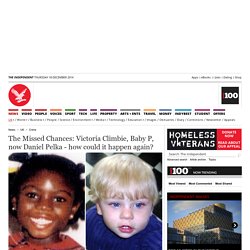
As his parents are sentenced today for months of abuse and cruelty, others who were meant to protect the child will be forced to confront their culpability for his death. We have been here before. The name of Daniel Pelka joins the roll-call of official failure that includes Baby P (Peter Connolly), who died in 2007 from dozens of injuries despite numerous visits by health and social services to his home. The same council, Haringey, was condemned over the death of eight-year-old Victoria Climbié, in 2000, who was tied up, burnt with cigarettes and beaten with bike chains by her guardians. The judge at their trial criticised the “blinding incompetence” of the people meant to protect her. Child Protection and Safeguarding in England: Changing and Competing Conceptions of Risk and their Implications for Social Work.
Nigel Parton⇓ + Author Affiliations Correspondence to Professor Nigel Parton, NSPCC Professor in Applied Childhood Studies, School of Human and Health Sciences, University of Huddersfield, Huddersfield, HD1 3DH, England, UK.
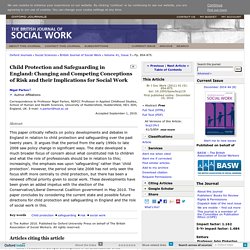
E-mail: n.parton@hud.ac.uk Accepted September 1, 2010. This paper critically reflects on policy developments and debates in England in relation to child protection and safeguarding over the past twenty years. It argues that the period from the early 1990s to late 2008 saw policy change in significant ways. Keeping_children_safe_in_education.pdf. VCF – Victoria Climbie Foundation » Child Protection Policies & Guidelines.
Professional relationships. Safeguarding.